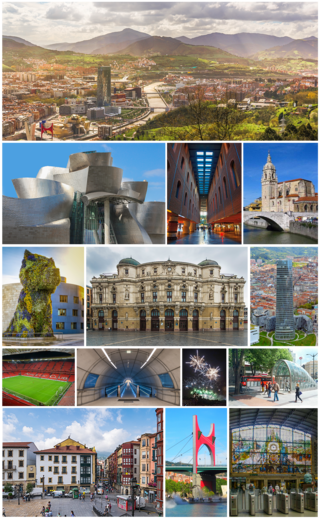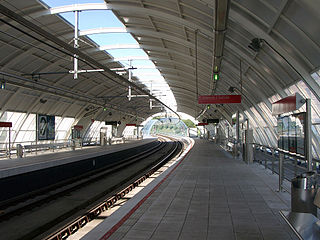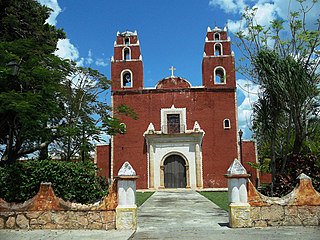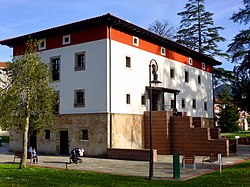
Bilbao is a city in northern Spain, the largest city in the province of Biscay and in the Basque Country as a whole. It is also the largest city proper in northern Spain. Bilbao is the tenth largest city in Spain, with a population of more than 347,000 as of 2023. The Bilbao metropolitan area has 1,037,847 inhabitants, making it the most populous metropolitan area in northern Spain; with a population of 875,552, the comarca of Greater Bilbao is the fifth-largest urban area in Spain. Bilbao is also the main urban area in what is defined as the Greater Basque region.

Balmaseda is a town and municipality located in the province of Biscay, in the Basque Country. Balmaseda is the capital city of the comarca of Enkarterri, in western Biscay and serves an important role in the province thanks to its proximity to the capital city of Bilbao and the regions of Cantabria and Castile and León.

The Bilbao metro is a rapid transit system serving the city of Bilbao and the region of Greater Bilbao. Lines 1 and 2 have a "Y" shape, as they transit both banks of the river Ibaizabal and then combine to form one line that ends in the south of Bilbao. Line 3 has a "V" shape connecting the municipality of Etxebarri with the Bilbao neighbourhood of Matiko; the apex of the "V" is Zazpikaleak/Casco Viejo station, where all three current lines meet. The metro is connected with the Bilbao tram, Bilboko Aldiriak, Euskotren Trena, Feve, Renfe long-distance trains, and Bilbao's bus station. All three lines use metre gauge.

Galdames is a town, valley, and municipality located in the Biscay province of the autonomous community of Basque Country, Spain.

Getxo is a town located in the province of Biscay, in the autonomous community of the Basque Country, in Spain. It is part of Greater Bilbao, and has 77,946 inhabitants (2019). Getxo is mostly an affluent residential area, as well as being the third largest municipality of Biscay.

Club Basket Bilbao Berri S.A.D., commonly known as Bilbao Basket, also known as Surne Bilbao Basket for sponsorship reasons, is a professional basketball club based in Bilbao, Spain. The team plays in the Liga ACB. Their home arena is the Bilbao Arena, Spain.
Novales is a municipality located in the province of Huesca, Aragon, Spain. According to the 2004 census (INE), the municipality has a population of 191 inhabitants. It is situated on a plain on the right bank of the river Guatizalema, about 16 km Southeast of Huesca.

Bilbao Bizkaia Kutxa (BBK) was a bank in Spain.

The Lordship of Biscay was a region under feudal rule in the region of Biscay in the Iberian Peninsula between c.1040 and 1876, ruled by a political figure known as the Lord of Biscay. One of the Basque señoríos, it was a territory with its own political organization, with its own naval ensign, consulate in Bruges and customs offices in Balmaseda and Urduña, from the 11th century until 1876, when the Juntas Generales were abolished. Since 1379, when John I of Castile became the Lord of Biscay, the lordship was integrated into the Crown of Castile, and eventually the Kingdom of Spain.

Line 2 of the Bilbao metro is a rapid transit line in Biscay, Basque Country, Spain. It runs from Basauri to Kabiezes. Its route covers the municipalities of Basauri and Etxebarri, the city of Bilbao and the left bank of the Nervión river. The line has 25 stations.

The autonomous community of the Basque Country within Spain contains several comarcas or eskualdeak in the Basque language, referring to local districts, grouped into its three long-established provinces.

Temax Municipality is a municipality in the Mexican state of Yucatán containing 329.52 square kilometres (127.23 sq mi) of land and located roughly 80 kilometres (50 mi) northeast of the city of Mérida.
In the run up to the 2019 Spanish local elections, various organisations carried out opinion polling to gauge voting intention in local entities in Spain. Results of such polls for municipalities and the three foral deputations in the Basque Country are displayed in this article. The date range for these opinion polls is from the previous local elections, held on 24 May 2015, to the day the next elections were held, on 26 May 2019.

Oskar Matute García de Jalón is a Spanish politician and a member of the Congress of Deputies of Spain. He was previously a member of the Basque Parliament.
In the run up to the 2015 Spanish local elections, various organisations carried out opinion polling to gauge voting intention in local entities in Spain. Results of such polls for municipalities and the three foral deputations in the Basque Country are displayed in this article. The date range for these opinion polls is from the previous local elections, held on 22 May 2011, to the day the next elections were held, on 24 May 2015.
In the run up to the 2023 Spanish local elections, various organisations carry out opinion polling to gauge voting intention in local entities in Spain. Results of such polls for municipalities and the three foral deputations in the Basque Country are displayed in this article. The date range for these opinion polls is from the previous local elections, held on 26 May 2019, to the day the next elections will be held, on 28 May 2023.

The Order of Cisneros is a state order of Spain created in 1944. It is named after Cardinal Francisco Jiménez de Cisneros. Primarily bestowed during the Francoist dictatorship and currently dormant, it rewarded political merit.

Gurutzi Arregi Azpeitia was a Spanish ethnographer. She was the director of the Ethnographic Research Group Etniker-Bizkaia, which systematically collects ethnographic materials of the Basque Country. She was a co-founder and also worked in the Labayru Fundazioa. Arregi coordinated the Ethnographic Atlas of the Basque Country.

Imanol Pradales Gil is a Basque politician and sociologist from Spain, member of the Basque Nationalist Party (EAJ-PNV). After leading his party in the 2024 regional election, he is expected to become the next Lehendakari.

Ricardo Vaquero Moreno, known as Richar Vaquero, is a Basque social educator, educational psychologist and politician.




















